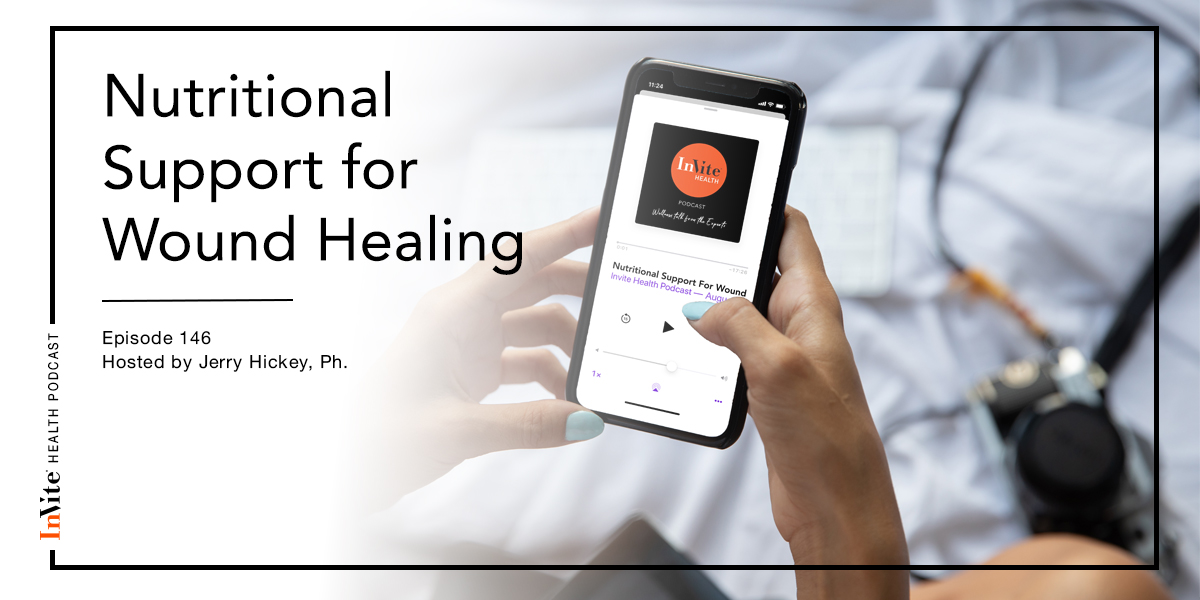Nutritional Support for Wound Healing – Invite Health Podcast, Episode 146

Invite Health Podcast, Episode hosted by Jerry Hickey. Ph
Subscribe Today!
Many different types of cells are needed for wound healing. The process of wound healing is very complex; here is what is happening inside of your body when you have a wound and the nutritional support you can provide it to heal efficiently, according to Jerry Hickey, Ph.
Inside of Your Body
The priorities for wound healing include an early arrival of immune cells. They must clear the damaged area of infection, damaged tissue and debris. The first responders are neutrophils, which clear the wounded area of damaged tissue and infectious particles and signal for the recruitment of macrophages to the wound.
Macrophages (big gobbling immune cells) take on a variety of roles in the wound healing process. Some macrophages assist in the removal of debris and damaged tissue, while others coordinate the remodeling of tissue at the wound site. Macrophages are essential to produce the signals for reepithelialization and dermal repair. Reepithelialization is the process for restoring the skin’s barrier. This allows a safe environment for healing the wound underneath. Skin building cells must rebuild the epidermal layer to act as a barrier against the outside world (germs, dirt, pollution, etc).
The underlying dermis must be rebuilt. Keratinocytes flow into the damaged area and rebuild the epidermis, which provides additional cells to fill in the wound site. A fibroblast is a type of cell that manufactures collagen and plays a critical role in wound healing. Fibroblasts of the surrounding dermis move into the wound during various stages of healing. Following a wound, a clot is formed to stop bleeding if blood vessels were ruptured. Fibroblasts stimulate the orderly removal replacing the clot with a more stable collagen matrix. Fibroblasts also participate in wound contraction, the drawing together edges of the wound and undamaged tissue in order to rebuild skin and tissue.
Lacking any of a number of nutrients will slow the wound healing process
- Vitamin C
- Protein
- Vitamin D
- Vitamin A – natural Beta-Carotene-
- Zinc
- Fatty Acids, like Omega-6 and Omega-3

Your Call To Action
Drink plenty of fluids. You’ll want to stay hydrated with lots of water to promote the formation of healthy skin that speeds wound healing. Water can improve the stages of wound healing. A lack of moisture at the wound’s surface will halt cellular migration, decrease oxygenation of the blood and vastly delay the wound treatment process. Here are a few reasons why hydration is such a crucial part of wound care and how to eliminate dehydration, as it can negatively impact your injury. When you’re dehydrated, abnormalities occur slowing healing. These traits may include poor oxygen supply and a decline in the delivery of essential nutrients not being delivered to the wound (your blood and lymph is mostly water). Water is the primary way that oxygen and nutrients are delivered directly to your wound and dehydration is one of the most common reasons why cell function becomes disrupted.
A lack of fluids creates delays in just about every aspect of wound healing, and if an injury doesn’t maintain proper moisture, epithelial cells that work to migrate over repaired tissue will not be able to cover the wound at a normal pace, leaving it more susceptible to open air and infection.
Your Diet. Eat protein such as fish to create collagen and for the immune system. Eat whole grains, fruits and vegetables to support healing (vitamins, minerals and beta-carotene) + along with fish for essential fatty acids
Supplementation. Take a multiple vitamin for B Vitamins, Vitamins C and D, Zinc, Copper, and Beta-Carotene. If your are a diabetic, take magnesium to assist in the release of melatonin, activation of vitamin D, and stabilization of ATP. If hypothyroid or diabetic, beta-carotene will not be sufficiently converted into vitamin A. If older, take Collagen. You should take Fish Oils if you don’t eat fish.
Thank you for tuning in to the Invite Health Podcast. You can find all of our episodes for free wherever you listen to podcasts or by visiting www.invitehealth.com/podcast. Make sure you subscribe and leave us a review! Follow us on Facebook, Twitter and Instagram at Invite Health today. We’ll see you next time on another episode of the Invite Health Podcast.

